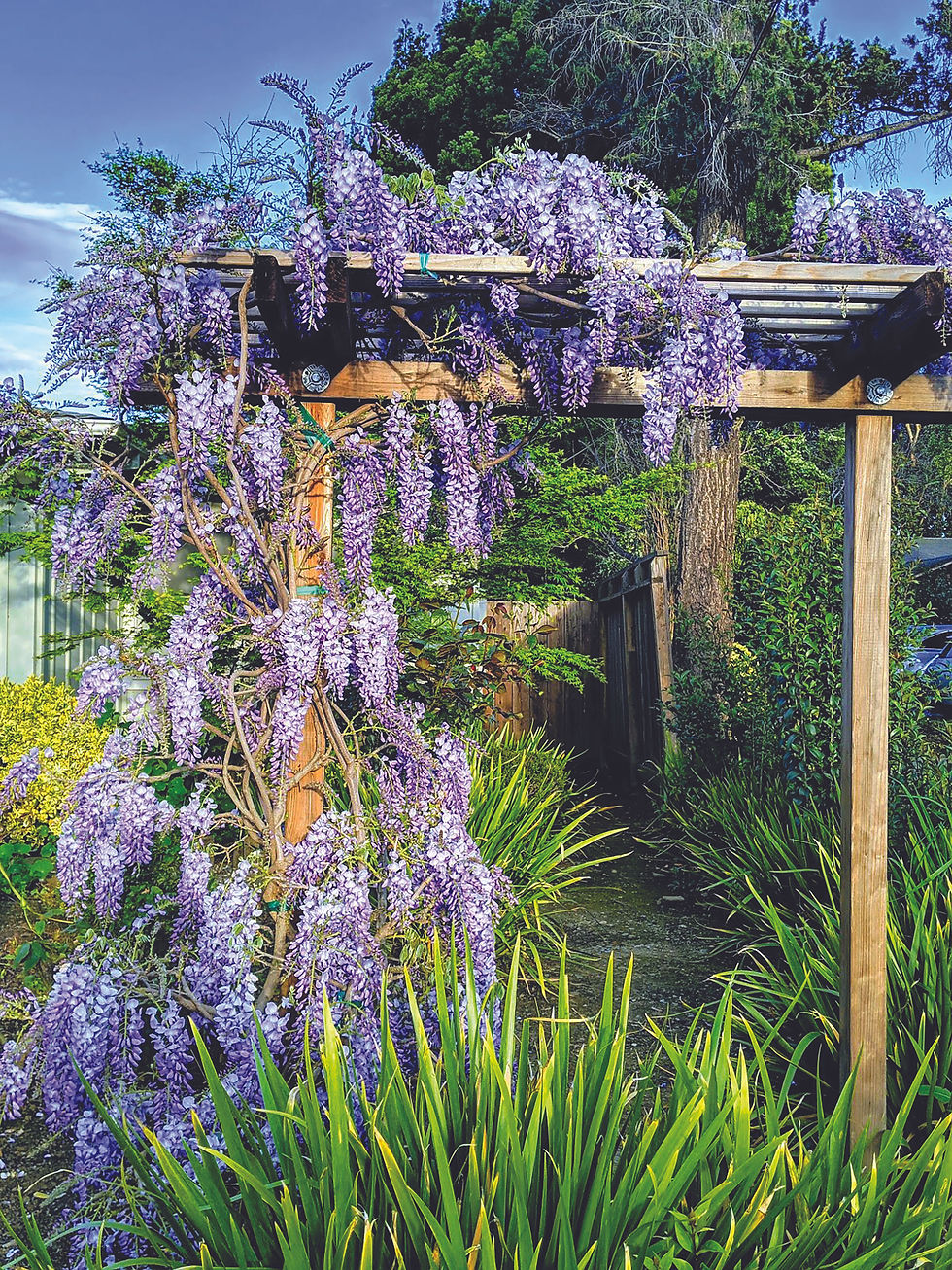The Tonic of Gardening During Quarantine
- Polo Lifestyles 2020

- May 27, 2020
- 3 min read

Last summer, when the world seemed mad but, in retrospect, was fine, I was searching for a permanent home. I found a big flat with a sunny roof terrace and, down a metal staircase, cursorily divided from the downstairs lady’s domain by an elfin picket fence, a wasteland of a yard. It was a mere nine by five meters, full of brambles, ivy, weeds and a yucca the size of Ozymandias’s skull: not perfect, not remotely, but I envisioned that, one day, perhaps, I would transform it.
That was B.C.—Before Coronavirus. Now I write this at my new study window, looking out at a London that appears to be functioning almost as usual. Even in lockdown, nobody knows how to behave. My view, mildly softened by translucent blinds, is of a busy road still populated by double-decker buses and red post-office vans, men in gas masks and old women on mobility scooters with toddlers on their laps. We are teetering on the edge of panic, cartoon toes curling and each of us is doing what brings sanity. The important people—nurses, teachers, social workers—grit their teeth and carry on.

What all gardeners know, and the rest of you may discover, is that if you have even the smallest space: a pot on a window ledge, a front step or a small yard, then there is no balm to the soul greater than planting seeds. Watching them begin to sprout, checking far too often as the firm yet fragile stems break free of the soil, the dry seed-case caps, is a joy so strong you can feel it in your knuckles. Rose-geranium leaves and thyme flowers and the hit of petrichor from damp soil, are the scents of heaven.
Dispersing homemade compost feels like alchemy: turning dead tulips and carrot tops to black gold. Some people grow flowers; unless they are edible—tangerine-orange calendula, Ionian borage—I’m not interested. On the other hand, Red Russian Kale could supply my loved ones with Vitamin C and bioflavonoids while simultaneously distracting us with its beauty: those gray-green fragile-looking leaves, their veins like rivers of wine.
Even before the coronavirus (B.C.), the potential to grow things and feed people was a thrill. Now it makes me tearful with something new: gratitude. Suddenly, my least-gardeny friends are panic-buying radish seeds, punching holes in the bottoms of plastic boxes to start their seedlings. I delight in the new additions to my team, like a cheery pusher. Before quarantine, when I was dehydrating, canning, making bread, yogurt and kimchi, they laughed at me. Now, suddenly, such things are almost a necessary act for maintaining sanity. To grow and preserve food is to remember that life continues.
I do not dare tell my new gardening friends that, despite all the renewed talk of victory gardens, self-sufficiency is an elusive dream. Growing edible plants, particularly in a city, is neither cheap nor easy. Without an abundance of space, and far more manure, any hopes of feeding the family without one’s weekly grocery delivery are unlikely to come true.
However, that is not the point. It’s the journey, not the harvest. Or so I tell myself. We all know in theory that nature brings peace, but now, more than ever, we should self-prescribe a dose of it. Look down as well as up. Look at the glossy dinosaur shells of woodlice, the scribbled clots of earthworm casts, the weirdness of what Thoreau called “the tonic of wilderness”, the patterns in lichen lobes and leaf veins, tree branches and bark. Wilderness is everywhere, even in cities.
The greatest evangelist for the peace which nature brings is the poet Mary Oliver, the patron saint of noticers. She would have appreciated the complexity of feeling garden-giddy in a time of crisis—of how it is to be, as she put it in her poem “The Summer Day,” both “idle and blessed.”
Meanwhile, outside, as a result of the shutdown, a miracle is occurring: birds sing from everywhere. I may have heard an owl. The springtime air, scented with magnolia and blossom, is, for London, almost pure. I have passed the time bagging ivy and wrenching roots from a predecessor’s forgotten borders, merrily chucking manure at the feet of my old pot-bound gooseberries, checking obsessively for vine buds. We who are healthy in our homes, with a pot of compost or a small patch of soil, are lucky. Let’s get going.

Charlotte Mendelson is a prize-winning British novelist and the author of “Rhapsody in Green,” a memoir about her passion for gardening.





代发外链 提权重点击找我;
蜘蛛池 蜘蛛池;
谷歌马甲包/ 谷歌马甲包;
谷歌霸屏 谷歌霸屏;
谷歌霸屏 谷歌霸屏
蜘蛛池 蜘蛛池
谷歌快排 谷歌快排
Google外链 Google外链
谷歌留痕 谷歌留痕
Gái Gọi…
Gái Gọi…
Dịch Vụ…
谷歌霸屏 谷歌霸屏
负面删除 负面删除
币圈推广 币圈推广
Google权重提升 Google权重提升
Google外链 Google外链
google留痕 google留痕
AV在线看 AV在线看;
自拍流出 自拍流出;
国产视频 国产视频;
日本无码 日本无码;
动漫肉番 动漫肉番;
吃瓜专区 吃瓜专区;
SM调教 SM调教;
ASMR ASMR;
国产探花 国产探花;
强奸乱伦 强奸乱伦;
代发外链 提权重点击找我;
谷歌蜘蛛池 谷歌蜘蛛池;
Fortune Tiger…
Fortune Tiger…
谷歌权重提升/ 谷歌权重提升;
谷歌seo 谷歌seo;
谷歌霸屏 谷歌霸屏
蜘蛛池 蜘蛛池
谷歌快排 谷歌快排
Google外链 Google外链
谷歌留痕 谷歌留痕
Gái Gọi…
Gái Gọi…
Dịch Vụ…
谷歌霸屏 谷歌霸屏
负面删除 负面删除
币圈推广 币圈推广
Google权重提升 Google权重提升
Google外链 Google外链
google留痕 google留痕
代发外链 提权重点击找我;
游戏推广 游戏推广;
Fortune Tiger Fortune Tiger;
Fortune Tiger Slots Fortune…
谷歌马甲包/ 谷歌马甲包;
谷歌霸屏 谷歌霸屏;
מכונות ETPU מכונות ETPU;
;ماكينات اي تي بي…
آلات إي بي بي…
ETPU maşınları ETPU maşınları;
ETPUマシン ETPUマシン;
ETPU 기계 ETPU 기계;
代发外链 提权重点击找我;
游戏推广 游戏推广;
Fortune Tiger Fortune Tiger;
Fortune Tiger Slots Fortune…
谷歌马甲包/ 谷歌马甲包;
谷歌霸屏 谷歌霸屏;
מכונות ETPU מכונות ETPU;
;ماكينات اي تي بي…
آلات إي بي بي…
ETPU maşınları ETPU maşınları;
ETPUマシン ETPUマシン;
ETPU 기계 ETPU 기계;